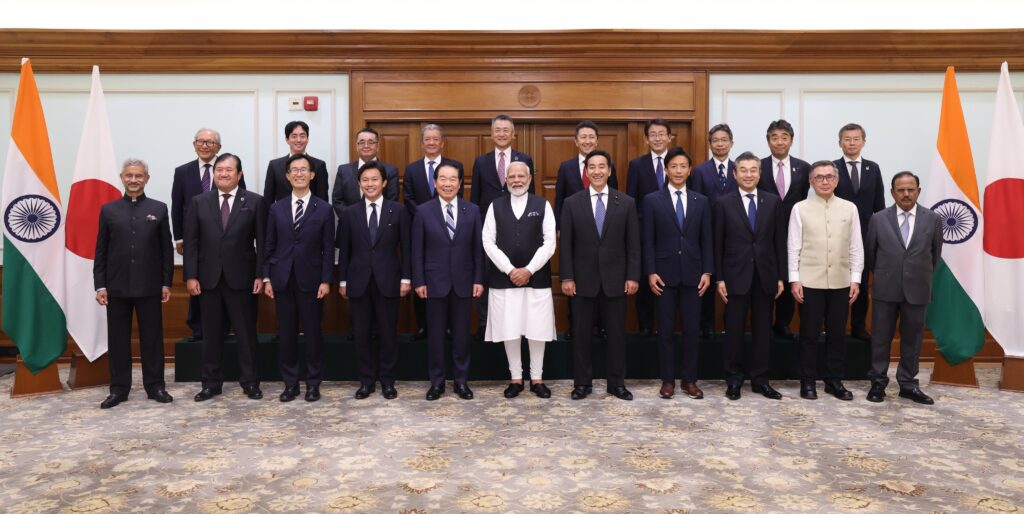Introduction: A Deepening Partnership
Prime Minister Narendra Modi recently met with Mr. Nukaga Fukushiro, the Speaker of the House of Representatives of Japan, and a delegation that included Japanese parliamentarians and business leaders. This meeting underscored the robust India-Japan Special Strategic and Global Partnership, which continues to grow in both scope and depth. As both nations strive to strengthen their bilateral ties, key areas of collaboration have emerged, focusing on both traditional and modern industries. This article explores these areas and highlights the future prospects for this important partnership.
Enhancing Economic and Business Ties
One of the central themes of the meeting was the discussion on how to enhance economic and business ties between India and Japan. Both sides expressed satisfaction with the progress made towards the ambitious target of a 5 trillion Japanese Yen investment between 2022 and 2027. This target, set to foster greater economic cooperation, serves as a foundation for discussions on further consolidating business and economic ties beyond 2027.
Investment and Economic Cooperation
The leaders discussed the critical importance of investment in strengthening economic ties. They emphasized the need to build upon the existing framework and explore new avenues for economic collaboration. The commitment to achieving the 5 trillion Yen investment goal reflects the mutual desire to create a sustainable economic partnership that benefits both nations.
Business Opportunities in Traditional and Emerging Sectors
The discussion also highlighted opportunities for collaboration in traditional manufacturing sectors, known in Japan as monozukuri, as well as in emerging domains such as semiconductors, electric vehicles (EVs), and green and clean energy. Both nations recognize the potential of these sectors to drive future growth and innovation, and they aim to leverage each other’s strengths to achieve shared objectives.
Advancing Technology and Innovation
In the rapidly evolving global landscape, technology and innovation are crucial to economic development. India and Japan are keen to collaborate in cutting-edge fields to stay competitive and foster sustainable growth.
Semiconductors and Advanced Manufacturing
The semiconductor industry is a key focus area for both countries, given its significance in the digital economy. By working together, India and Japan can harness their technological expertise and manufacturing capabilities to become leaders in semiconductor production. This collaboration can lead to the development of advanced manufacturing technologies that will benefit both nations.
Electric Vehicles and Sustainable Energy
The transition to electric vehicles and sustainable energy sources is another priority for India and Japan. Both countries are committed to reducing their carbon footprints and are exploring ways to collaborate on developing EV technologies and green energy solutions. This partnership can drive innovation and create new business opportunities in the renewable energy sector.
Training and Capacity Building
Training and capacity building are essential components of the India-Japan partnership. Mr. Nukaga proposed initiatives to nurture and train the next generation workforce, emphasizing the importance of skills development in various trades.
Japanese Language and Cultural Training
A significant aspect of the training initiatives is the focus on Japanese language and cultural education for Indian youth. By understanding Japanese culture and work practices, the workforce can better integrate into Japanese businesses and contribute to bilateral cooperation. This cultural exchange will enhance mutual understanding and strengthen people-to-people ties.
Role of the Private Sector
The private sector plays a vital role in training and capacity-building efforts. By investing in education and skill development, businesses can create a workforce that is well-equipped to meet the demands of a dynamic global economy. The collaboration between government and industry is crucial for achieving these goals.
Infrastructure Development and Strategic Projects
Infrastructure development is a key area of collaboration, with the Mumbai-Ahmedabad High-Speed Rail project serving as a flagship initiative.
High-Speed Rail and Connectivity
The successful and timely completion of the Mumbai-Ahmedabad High-Speed Rail project is a testament to the strength of the India-Japan partnership. This project not only enhances connectivity but also showcases the potential for future collaboration in infrastructure development. By working together on such strategic projects, both countries can drive economic growth and improve quality of life for their citizens.
Future Infrastructure Initiatives
Beyond the high-speed rail project, India and Japan are exploring other infrastructure initiatives that can further strengthen their partnership. By investing in modern infrastructure, both nations can support sustainable urban development and create new economic opportunities.
India’s Business Environment and Reforms
Prime Minister Modi highlighted the conducive business environment and reforms undertaken in India to attract more investment and technology from Japan. These efforts aim to create a favorable climate for Japanese companies to operate and thrive in India.
Reforms and Regulatory Changes
India’s government has implemented several reforms to improve the ease of doing business and attract foreign investment. These include regulatory changes, tax incentives, and initiatives to streamline business processes. Such reforms enhance India’s appeal as a destination for Japanese investment and foster a mutually beneficial partnership.
Government Support and Facilitation
The Indian government is committed to supporting Japanese businesses and facilitating their operations in India. By providing the necessary infrastructure and resources, the government ensures that Japanese companies can effectively contribute to India’s economic growth and development.
Conclusion: A Promising Future
The meeting between Prime Minister Modi and Speaker Nukaga Fukushiro reaffirmed the importance of the India-Japan Special Strategic and Global Partnership. As both nations continue to collaborate in key areas such as economic cooperation, technology, training, and infrastructure development, the future looks promising for this enduring partnership. By working together, India and Japan can address global challenges, drive innovation, and create a more prosperous future for their people.

